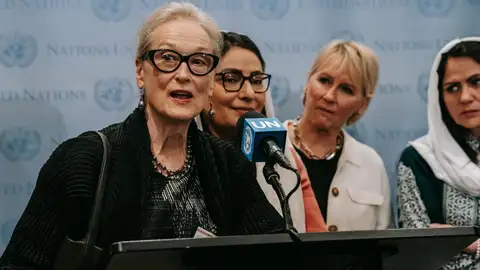Afghan authorities and their de facto government seek to turn women into "faceless, voiceless shadows" through new laws that reinforce existing human rights violations in the Asian country.
Since the Taliban seized power in Afghanistan in 2021, women and girls have been stripped of almost all their rights. Four years later, the situation has only worsened.
In Afghanistan, to be a woman is to live in a prison without walls. Since the Taliban came to power, girls are forbidden to study, condemned to ignorance; women cannot work, silenced and confined to the home; they cannot play sports; they cannot appear in public media, erased from society; and they cannot go out on the street without covering their face and body, stripped of their identity. They cannot look out onto balconies or be seen from a window, as if their mere presence were a threat. They have been forbidden to sing, and even more cruelly, to listen to another woman's voice. Along with their income, they have lost their dignity.
In life, one action always triggers another, whether we want it or not. This oppression not only erases women from society, but condemns them to total dependence. Without education, employment or even the freedom to move, many families see forced marriage as the only way out for their daughters, handing them over to much older husbands in exchange for a dowry or simply to reduce the economic burden. But once married, there is no escape: the Taliban have annulled the right to divorce, leaving thousands of women trapped in abusive marriages or, worse, forced to return to their abusers, with no chance of ever freeing themselves from domestic violence.
"We are not human, we have no feelings, we have nothing anymore, we feel like we are nothing anymore."
Afghan woman in British interview.
In Taliban Afghanistan, women have been reduced to a lower status, considered little more than possessions under the control of their fathers, husbands or brothers. They are viewed by a culture that considers them invisible and insignificant in the eyes of men. They are not allowed to leave the house without a male escort, a "mahram"; nor to receive medical attention from male doctors; nor to scream in pain in hospitals if men are around, as their voice is considered a "temptation".
Punishment for defying these rules is brutal. Women who are seen on the street without the imposed dress or without a male guardian are beaten with whips in public or even arbitrarily detained. In addition, any attempt to speak out against the regime is harshly repressed. The human right to freedom of expression has been completely nullified for them, as peaceful protests by women demanding their right to education and work have been repressed with tear gas, gunshots in the air and abductions in which women are forced to record "confessions" in which they retract their demands.
The Taliban, for their part, deny the endless allegations of gender discrimination, arguing that they act in accordance with Islamic Sharia law. But this, coupled with non-interference by states, means that women's place behind doors, where violence is invisible, is considered private.
Every day, Afghan women struggle to survive in a system that oppresses and marginalizes them, but the international community is beginning to understand that indifference is the worst harm that can be done. Women around the world are joining forces and raising their voices in defense of those who have been silenced. The clearest example of this global solidarity is the powerful speech of actress Meryl Streep who truthfully and starkly stated:
" A squirrel has more rights than a girl today in Afghanistan".

But Afghan women don't just need words, they need action. They need the government to understand that women's rights are human rights; they are not only an essential inheritance of the dignity but also of the value of the human person. They need the world not to forget them, for the international community to stop looking the other way and, together with them, to exert real pressure on a regime that condemns them to confinement and submission.
History has shown that no system of oppression and dictatorship is eternal, and although today the future seems bleak, the resistance of these women continues to beat in every silenced protest and in every hope that still refuses to die. Because the struggle for freedom and human rights has no borders and as long as there are voices that still stand up for them, their cause will live on.

Comments